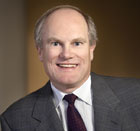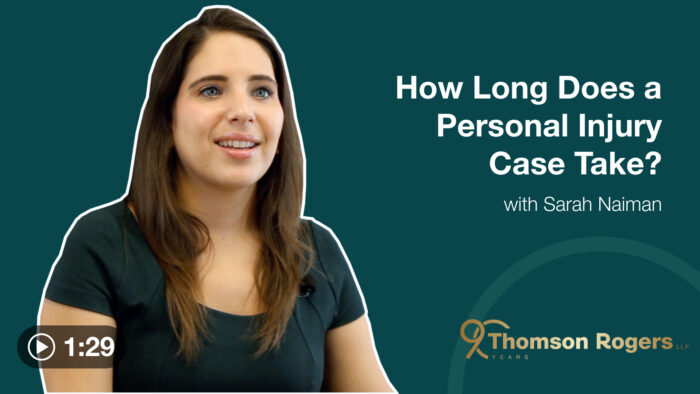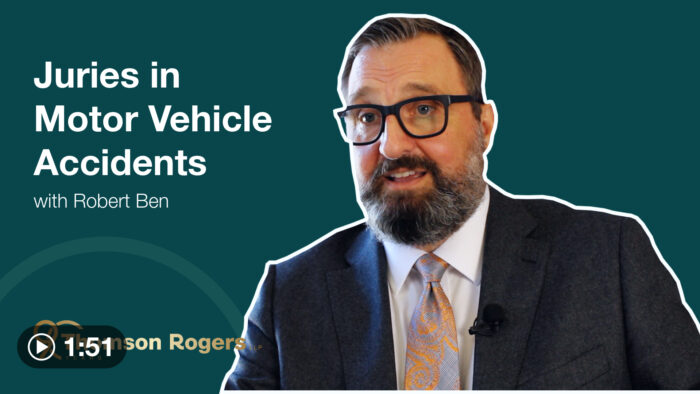Moore v. Getahun – Experts, Reports and Consultations with Legal Counsel
Author(s): Alan A. Farrer
January 29, 2015

The Ontario Court of Appeal released its much anticipated decision in Moore v. Getahun.
The case dealt with circumstances surrounding allegedly negligent medical care following a motorcycle accident. However, it was the rulings by the trial judge about the legal effect of communications between trial counsel and an expert witness that made this case of general interest to all lawyers and expert witnesses in Ontario.
The Court of Appeal summarised this issue in its reasons, as follows:
“During cross-examination, Dr. Taylor indicated that he had sent a draft of one of his reports to the appellant’s counsel for review. Dr. Taylor testified that he had produced his final report following an hour and a half conference call with counsel. Although the respondent’s counsel did not pursue this issue, the trial judge expressed her concern over what had occurred. She asked Dr. Taylor to organize his file in chronological order and to provide the court with his draft reports. After counsel had completed their examinations of Dr. Taylor, she proceeded to question Dr. Taylor about his draft reports, the meetings he had with the appellant’s counsel and any changes that he had made to his reports as a result. When Dr. Taylor indicated that there was another file that he did not have with him, she directed the appellant’s counsel to provide the court with all instructing letters and records of any conference calls, and asked Dr. Taylor to return the next day. That led to a detailed review of Dr. Taylor’s draft reports as well as scrutiny of the notations and changes he made as a result of discussing his draft reports with the appellant’s counsel.
In her reasons for judgment, the trial judge commented adversely on the consultation between Dr. Taylor and the appellant’s counsel, and on Dr. Taylor’s reaction in the witness stand when confronted with the fact that he had discussed his draft with counsel.
The trial judge was plainly troubled by the suggestion that Dr. Taylor had reviewed his draft report with the appellant’s counsel. The issue first emerged in answer to a question during Dr. Taylor’s cross-examination, but the respondent’s counsel did not pursue it at any length. The trial judge took up the issue and, as I have indicated, directed Dr. Taylor to produce his draft reports and the notes he made while discussing them with the appellant’s counsel. The trial judge questioned Dr. Taylor at length about the precise changes he had made as a result of those discussions.
The trial judge was critical of the appellant’s counsel for having discussed Dr. Taylor’s draft report with him during an hour and a half telephone conference call. She concluded that there had been significant changes. The trial judge stated, at paras. 287-288, that this put Dr. Taylor in a “very awkward situation” as he was “obviously totally unaware that it may be improper to discuss and change a draft report, as a breach of his duty of impartiality.” She commented adversely on Dr. Taylor’s credibility, at para. 291, on account of “a dramatic difference in the tone and demeanor of Dr. Taylor’s evidence” after he was confronted with the fact that he had made changes to his report as a result of discussions with counsel. She rejected his explanation that the changes were minor, found that he minimized the changes and concluded, at para. 293:
I conclude that the meeting between defence counsel and Dr. Taylor involved more than simply superficial, cosmetic changes. The conversation took place over a period of one and a half hours. Some content helpful to the plaintiff in the August 27, 2013 draft report was deleted or modified. I find that Dr. Taylor’s opinion, although not changed, was certainly shaped by defence counsel’s suggestions.
The trial judge strongly disapproved of the practice of counsel reviewing draft expert reports. She stated, at para. 52:
The practice of discussing draft reports with counsel is improper and undermines both the purpose of Rule 53.03 as well as the expert’s credibility and neutrality.
The trial judge expanded upon this proposition, at para. 520:
The purpose of Rule 53.03 of the Rules of Civil Procedure is to ensure the independence and integrity of the expert witness. The expert’s primary duty is to the court. In light of this change in the role of the expert witness under the new rule, I conclude that counsel’s practice of reviewing draft reports should stop. There should be full disclosure in writing of any changes to an expert’s final report as a result of counsel’s corrections, suggestions, or clarifications, to ensure transparency in the process and to ensure that the expert witness is neutral.
The trial judge was obviously of the view that the then current practice and the ethical rules and standards of the legal profession were inadequate to deal with the “hired gun” problem. Her solution was to strictly control discussions between expert witnesses and counsel and to require that all discussions be documented and subject to disclosure and production.”
The Ontario Court of Appeal disagreed.
In its ruling today the Court stated that it would be bad policy to disturb the well-established practice of counsel meeting with expert witnesses to review draft reports. Just as lawyers and judges need the input of experts, so too do expert witnesses need the assistance of lawyers in framing their reports in a way that is comprehensible and responsive to the pertinent legal issues in a case, held Justice Sharp, speaking for the Court.
The Court of Appeal went on to give this practical guidance:
[63] Consultation and collaboration between counsel and expert witnesses is essential to ensure that the expert witness understands the duties reflected by rule 4.1.01 and contained in the Form 53 acknowledgment of expert’s duty. Reviewing a draft report enables counsel to ensure that the report (i) complies with the Rules of Civil Procedureand the rules of evidence, (ii) addresses and is restricted to the relevant issues and (iii) is written in a manner and style that is accessible and comprehensible. Counsel need to ensure that the expert witness understands matters such as the difference between the legal burden of proof and scientific certainty, the need to clarify the facts and assumptions underlying the expert’s opinion, the need to confine the report to matters within the expert witness’s area of expertise and the need to avoid usurping the court’s function as the ultimate arbiter of the issues.
[65] Leaving the expert witness entirely to his or her own devices, or requiring all changes to be documented in a formalized written exchange, would result in increased delay and cost in a regime already struggling to deliver justice in a timely and efficient manner. Such a rule would encourage the hiring of “shadow experts” to advise counsel. There would be an incentive to jettison rather than edit and improve badly drafted reports, causing added cost and delay. Precluding consultation would also encourage the use of those expert witnesses who make a career of testifying in court and who are often perceived to be hired guns likely to offer partisan opinions, as these expert witnesses may require less guidance and preparation. In my respectful view, the changes suggested by the trial judge would not be in the interests of justice and would frustrate the timely and cost-effective adjudication of civil disputes.
[70] Pursuant to rule 31.06(3), the draft reports of experts the party does not intend to call are privileged and need not be disclosed. Under the protection of litigation privilege, the same holds for the draft reports, notes and records of any consultations between experts and counsel, even where the party intends to call the expert as a witness.
[73] It is important to note that the litigation privilege attaching to expert reports is qualified, and disclosure may be required in certain situations.
[77] In my view, the ends of justice do not permit litigation privilege to be used to shield improper conduct. As I have already mentioned, it is common ground on this appeal that it is wrong for counsel to interfere with an expert’s duties of independence and objectivity. Where the party seeking production of draft reports or notes of discussions between counsel and an expert can show reasonable grounds to suspect that counsel communicated with an expert witness in a manner likely to interfere with the expert witness’s duties of independence and objectivity, the court can order disclosure of such discussions. See, for example, Ebrahim v. Continental Precious Minerals Inc., 2012 ONSC 1123 (S.C.), at paras. 63-75, where the court ordered disclosure of draft reports and affidavits after an expert witness testified that he did not draft the report or affidavit containing his expert opinion and admitted that his firm had an ongoing commercial relationship with the party calling him.
The Court of Appeal has clarified this relationship and the rules governing interaction for trial lawyers and experts. Now, “absent a factual foundation to support a reasonable suspicion that counsel improperly influenced the expert, a party should not be allowed to demand production of draft reports or notes of interactions between counsel and an expert witness”.
Share this






